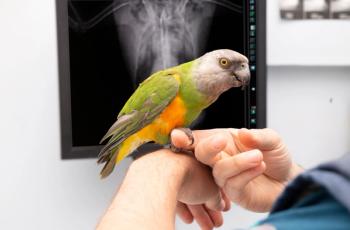
- dvm360 October 2021
- Volume 52
- Issue 10
Pet food trends: Bug protein and cannabis

Can these alternative ingredients enhance the nutritional value of meals for companion animals?
It’s no secret that pet parents often scour the Internet in search of the next best thing for their pets—especially when it comes to nutrition. With the vast amount of emerging ingredients being used in pet food, it is necessary to understand the nuances of these components, and which can provide a robust balance of protein for pets.
During her lecture at the Fetch dvm360® Kansas City conference, Robin Saar, RVT, VTS (Nutrition), national nutrition ambassador at VetStrategy, explained that the key to pets leading longer, healthier lives is providing complete and balanced nutrition in a meal—which may come from insect protein and cannabis. Saar shared findings from several studies on the advantages and disadvantages of these protein sources and how each can be used to enhance a pet’s diet.
How do bugs fit into the pet food scene?
According to Saar, life-cycle assessments (LCAs) have traditionally been published for mealworms, house crickets, black soldier flies, and houseflies, and they use benchmarks to provide comparisons of insect production systems. For example, one study found that mealworms used as a protein-rich food can be comparable to meat and milk. Similarly, houseflies and blackflies, as protein-rich feed ingredients, can be compared to fish meal and soybean meal.1
So how exactly do bugs fit into the pet food equation? Saar noted the following environmental advantages of insect farming1:
- Less land and water required.
- Greenhouse gas emissions are lower.
- Insects have high feed-conversion efficiencies.
- Insects can transform low-value organic by-products into high-quality food or feed.
- Public demand for meat protein is expected to rise 75% by 2050 and the pet population also continues to increase, which could potentially lead to meat protein shortages.
However, the nature of this protein resource does not come without concern. Saar advised that investigations into insect protein should happen immediately because it can take years of experience to create a balanced and delectable diet, complete feeding trials, and ensure no unforeseen complications can occur. She explained that one risk of utilizing insect protein stems from contamination factors including metal and chemical pollution, such as insecticides that can be found with black soldier flies. This species tends to accumulate heavy metal from their feed (particularly cadmium and lead).1
Utilizing cannabinoids
Saar noted that although it is currently illegal to feed hemp or its by-products to livestock because of the unproven risk of cannabinoid residuals in animal-based products (eg, meat, eggs, milk), studies have shown that hempseeds and their derivatives may be a viable source of crude protein and essential fats to incorporate into the diet of livestock, without particular changes in growth performance.2
Saar referenced one study on how mice with autoimmune encephalomyelitis (EAE) showed an abundance of mucin-degrading bacteria species such as Akkermansia muciniphila, which was significantly reduced after treatment with Δ-9-tetrahydrocannabinol (THC) plus cannabidiol (CBD). According to Saar, the mice with EAE treated with THC plus CBD also displayed notably higher levels of short-chain fatty acids including butyric, isovaleric, and valeric acids versus naive or disease controls. The data gathered suggest that cannabinoids may reduce EAE and suppress neuroinflammation by averting microbial dysbiosis seen during EAE and nurturing healthy gut microbiota.3
Benefits of cannabinoids’ ability to interact with the endocannabinoid include reducing intestinal permeability, regulating gut bacteria, and reducing inflammation. Saar also noted that CBD may affect an animal’s response to anxiety and pain because of its activity across the digestive, immune, and central nervous systems.4
She concluded that no part of the cannabis plant is currently approved for use in pet food and that companies in the industry that wish to use these products must first provide accurate research showing the products are both safe and beneficial in animal food.5
The bottom line
At the end of the day, pet owners want the best nutrition for their companions—and it is up to veterinary professionals to help support and advise pet parents searching for the food choice that best matches their pet’s needs. Saar explained that having open discussions that support owners through their choices and becoming their trusted confidant are vital in sustaining long-term relationships in clinic settings.
References
- van Huis A, Oonincx D. The environmental sustainability of insects as food and feed. a review. Agron Sustain Dev. 2017;37:43.
doi:10.1007/s13593-017-0452-8 - Della Roca G, Di Salvo A. Hemp in veterinary medicine: from feed to drug. Font Vet Sci. 2020;7:387. doi:10.3389/fvets.2020.00387
- Al-Ghezi ZZ, Busbee PB, Alghetaa H, Nagarkatti PS, Nagarkatti M. Combination of cannabinoids, delta-9-tetrahydrocannabinol (THC) and cannabidiol (CBD), mitigates experimental autoimmune encephalomyelitis (EAE) by altering the gut microbiome. Brain Behav Immun. 2019;82:25-35.
doi:10.1016/j.bbi.2019.07.028 - Karoly HC, Mueller RL, Bidwell LC, Hutchinson KE. Cannabinoids and the microbiota-gut-brain axis: emerging effects of cannabidiol and the potential applications to alcohol use disorders. Alcohol Clin Exp Res. 2020;44(2):40-353. doi:10.1111/acer.14256
- The Association of American Feed Control Officials. AAFCO guidelines on hemp in animal food.
https://www.aafco.org/Portals/0/SiteContent/Announcements/Guidelines_on_Hemp_in_Animal_Food_July_2020.pdf . Published March 5, 2017. Updated July 16, 2020. Accessed August 26, 2021.
Articles in this issue
about 4 years ago
What makes a cat a healthy pet?about 4 years ago
Reunited in person and it feels so good!about 4 years ago
Dental health test kit aids in preventing common disease in catsover 4 years ago
Pet insurance proves valuable to many clientsover 4 years ago
The Dilemma: Promoting a secure, comfortable workplaceover 4 years ago
Dermatologic cytology 101: Tips for collecting samplesover 4 years ago
10 Things to consider when selling a veterinary practiceover 4 years ago
Canine Osteosarcoma: Teaching an Old Dog New TricksNewsletter
From exam room tips to practice management insights, get trusted veterinary news delivered straight to your inbox—subscribe to dvm360.




